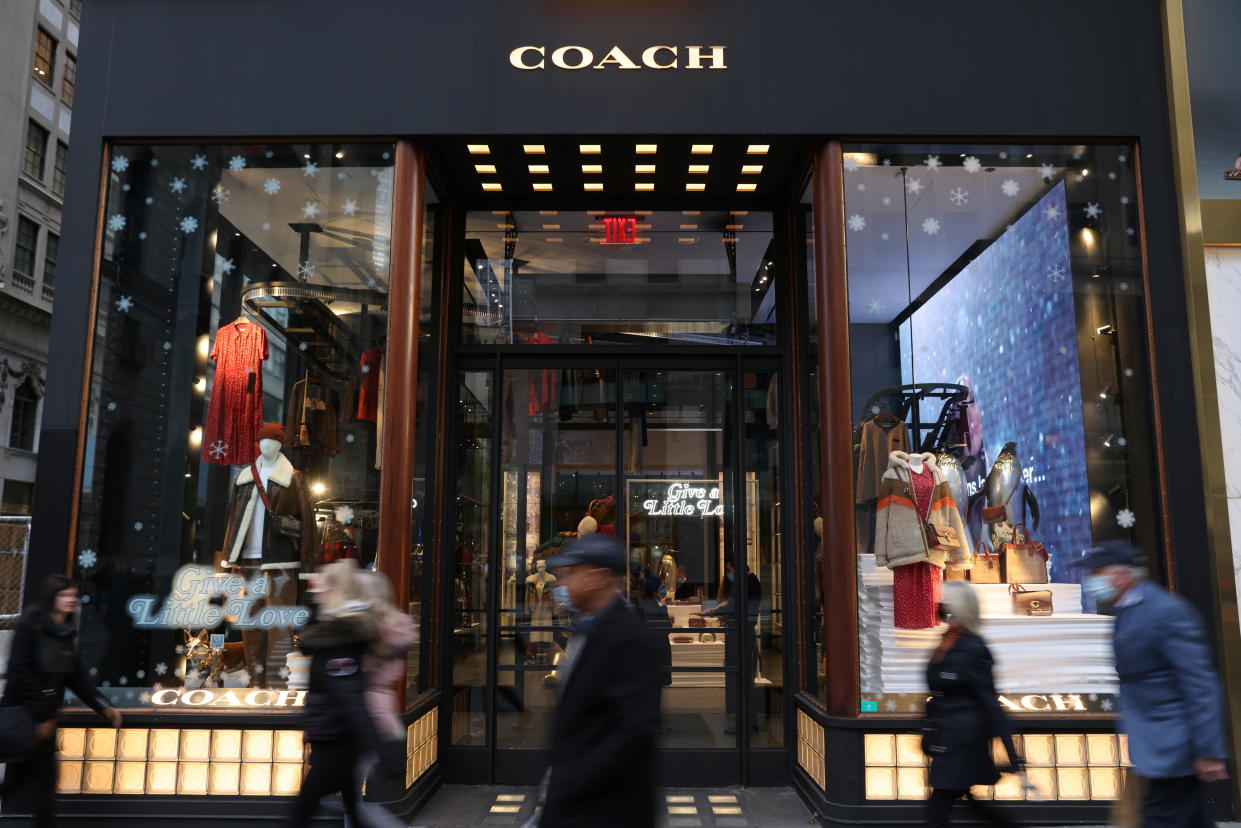Coach's parent Tapestry is spending $8.5 billion to buy the owner of Michael Kors
Another blockbuster deal in the world of fashion.
Tapestry (TPR) shocked Wall Street on Thursday by announcing it will spend $8.5 billion — or $57 a share — to buy rival Capri Holdings (CPRI) for a total enterprise value of $8.5 billion. The transaction will see Tapestry — the steward of Coach, Kate Spade, and Stuart Weitzman — gain control of Versace, Michael Kors, and Jimmy Choo.
"This combination expands our global reach," Tapestry CEO Joanne Crevoiserat said on a conference call as to the strategic rationale for the purchase.
Capri stock surged 59% to $54.82 in premarket trading. Tapestry shares fell 4% to $39.54 as some on Wall Street began to question the need to pull the trigger.
"We view the deal as positive for Capri shareholders, but are surprised Tapestry would want to acquire the co. given existing brand similarities, momentum with current strategy, and potential execution issues," said Jefferies analyst Ashley Helgans in a client note. BMO Capital Markets analyst Simeon Siegel also said the deal came as a "surprise."
Here are several high-level points from the term sheet:
The purchase price marks a 39% premium to Capri's closing price on Wednesday.
$200 million in cost synergies expected by three years after deal closes.
17% quarterly dividend approved despite the transaction.
Deal expected to close in 2024.
Deal will be funded through a mix of new debt and cash on the balance sheet.
The transaction marks the next chapter for Tapestry CEO Joanne Crevoiserat.
Crevoiserat joined Tapestry in 2019 as chief financial officer after successful stints as CFO and COO of Abercrombie & Fitch. Come October 2020, Crevoiserat was named CEO amid deep struggles for the Coach and still newly acquired Kate Spade brands.
The longtime retail exec moved quickly to slash hundreds of millions in costs via store closures and corporate head count reductions. She has also sharpened how new handbags and accessories are brought to market — doing so has helped keep inventory under control and margins solid.

Tapestry has been an aggressive acquirer of its stock as a means to reward shareholders, too.
Through the first three fiscal quarters of this year, the company has bought back $502 million of its shares. A year ago, for comparison, Tapestry repurchased about $1.2 billion in stock.
In turn, Tapestry has seen earnings growth accelerate from 4.5% in the fiscal year ended June 2020 to 9.5% in the fiscal year ended April 2023. Analysts expect Tapestry to grow earnings by 12.4% in its current fiscal year.
"We have moved quick to transform our company," Crevoiserat added on the call.
Shares of Tapestry have gained about 92% since Crevoiserat assumed the CEO role.
Meanwhile, the transaction also represents the ongoing chapter of deals in the luxury good space.
Within the last three years, LVMH spent $15.8 billion to buy Tiffany & Co. and $3.5 billion for a majority stake in Birkenstock.
Just this year alone has brought Kering buying a 30% stake in Valentino for $1.7 billion and spending $3.8 billion to scoop up all of high-end fragrance maker Creed.
For its part, Capri spent $2.1 billion to buy Versace in 2018 and $1.2 billion on Jimmy Choo in 2017.
Brian Sozzi is Yahoo Finance's Executive Editor. Follow Sozzi on Twitter @BrianSozzi and on LinkedIn. Tips on deals, mergers, activist situations, or anything else? Email brian.sozzi@yahoofinance.com.
Click here for the latest stock market news and in-depth analysis, including events that move stocks
Read the latest financial and business news from Yahoo Finance
